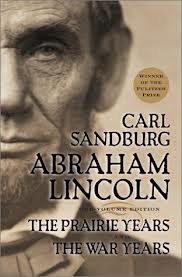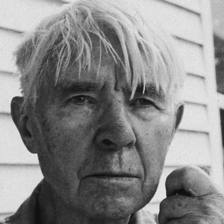There are scores of Lincoln biographies. I have long been dimly aware of a multi-volume biography of Abraham Lincoln by that poet of the Great Plains, Carl Sandburg, but eight volumes was much more than I wanted. In the oral version from Audible it runs to 44 hours. However I did notice that there was a one volume abridgement. That then was the obvious choice. A biography of the most famous son of Illinois by the most renown poet of Illinois.

All the well known stories are there and I shall not retail them.
New to me
Length and variety of his militia service
Travel down the river to New Orleans
Early and unequivocal objection to slavery on moral grounds in public statement occasioned by pursuit of runaways slaves into illinois
His gradual drift into politics because government could build bridges, dig drains, etc that this small community could never do. Local improvements, they were called at the time.
Saw Zachery Taylor and William Henry Harrison who both later became president.
By 1837 Lincoln opposed slavery on moral grounds, but accepted it in the South because of the Constitution.
As a mediator he learned from his father’s example of dealing with eight children of a blended family in a one-room cabin. Defuse the situation and illustrate with humor
He spoke up on local improvements and because he had learned to read and write, others who could not do either turned to him to prepare petitions.
He became a state representative as Whig, worked hard at committees, reports, speeches
He saw and served in some run away slave case in Illinois.
He was a one-term congressman as a Whig, campaigned for other Whigs in Ohio, Pennsylvania, Kentucky.
Lincoln voted several times for the Wilmot Provision to prevent slavery in new territories and states.
In his notebooks Lincoln puzzled over the morality, constitutionality, legality of slavery in whole and in part for years.
He concluded it was immoral since 1837, only indirectly constitutional in the States that had it a when the constitution was agreed, but fugitive slave act was legal, made by congress.
So he wanted to stop spread of slavery to other or new states, stop slave trade bringing in new slaves, but not for ending it since it was legal and partly constitutional in South Carolina and its ilk and since there was no way to cope with one million slaves in seven states who would be made free overnight and impossible to work out how to do it gradually, So on practical grounds there was no solution. Abolitionists seemed to have no plan for what to do if slavery were abolished, rather like all the Greens today who scream immediate action without a thought for consequences. He would have preferred to keep the Missouri compromise but it lapsed with the Compromise of 1850 which was a hodgepodge of deals and concessions much too delicately balanced to last.
Anti-immigrant and anti-Catholic Know Nothing Party arose (reminds me of Tea Party!)
Lincoln supported immigrants to vote, to get citizenship quickly and they voted for him.
The number of immigrants at the period is enormous 12,000 a month in Chicago, not all stayed there but went on to Indiana, Iowa, Kansas, Missouri, and Nebraska.
When the Free Soil Party morphed into Republicans at Ripon Wisconsin (an event no longer celebrated on the Republican National Committee website, such is the pernicious influence of the ideologues) Lincoln had no baggage as an old time Whig, he was from the West and fresh and energetic, and he wanted the presidential nomination in 1860.
He seemed to like being at the centre of things in Illinois legislature and got the ambition.
In a four-way race he won the electoral vote on the popular vote in the larger, northern states. The Southern states started seceding from the Union long before he took the oath of office in March 1961.
Lincoln the president was slow, thoughtful, pragmatic, thick-skinned, patient, mindful of his limitations and those of others. Not to be stampeded by cabinet, nor by generals, nor by the press.
Scurrilous animosity of many in the House and the Senate is hard to credit but it is palpable, and only occasionally silenced. Even Lincoln’s re-election did not shut them up. Th calumny heaped on him by Senate Republicans, war democrats, peace democrats, abolitionists, to say nothing of the Confederates beggers belief.
The restraint in the Emancipation Proclamation was to try to prise the three border states and Delaware away from the Confederacy by not confiscating property of slave holders in those states.
He found slavery objectionable not because of the equality of blacks, but for the debasement it brought to the master. More and more though he did realize that blacks were not only sentient but more. Frederick Douglas and other blacks he met lead him along this path, as did they blacks in the Union army, about 200,000 of them by 1865.
Lincoln’s 10% plan. Those states partly occupied by Union army in 1862 and 1863 like Florida, Louisiana. If petitioned by 10% of males citizens computed against 1860 census he proposed that these state be permitted to form a loyal Union government and to rejoin the Union. For example, Louisiana would have a rebel government in Shreveport and a Union government in New Orleans.
Congress would not agree for a variety of reasons: for some the states which seceded had committed suicide and were no longer states at all, for some these states should be treated as conquered territory under military occupation, for some this plan was a sneaky Lincoln way to get more Republican voters first to get re-nominated instead of Chase and then to get more electoral votes in the general election, for some the were constitutional and legal technicalities that would take ages to be resolved through courts. Were now free blacks to sign these petitions? The House and the Senate would not seat representatives or senators from these ersatz states for all of these reasons and more. This was a mistake, Lincoln thought, because it made fighting on the only choice for some who might otherwise lead a reconciliation. The war between executive and legislature never ends, and there are few truces.
Later in the war Lincoln also tried to set up local governments in East Tennessee that had always been loyal so to protect the loyalists from revenge of losing Confederates. Again congress resisted on analogous grounds.
Lincoln toyed with offering to buy slaves remaining in Deep South to end the war. He claimed it would be no more expensive in money than continuing the war and it would save lives and the destruction of property.
Lincoln ignored distinction of church and state several times a national days of prayer.
Scores and scores of personal petitions to Lincoln and he heard and read just about all of them, and often conceded the exception they asked. That bothered me because I have always resisted making exception for the one in front of me because (1) there many equally placed who were not in front of me for whom I was going to do nothing and (2) I did not want to encourage others to present their petitions to me. My thought was that if here is a reason to make an exception it should be written into the rules. Sandburg does nothing to analyze or assess Lincoln’s response to these petitions.
The endless flood of office seekers even in the dark days of 1864 would be enough to slay a lesser man.
Of all the wonderful remarks Lincoln made, these two say it all.
1. ‘My policy is to have no policy’ (p. 239). An oft repeated remark. Imagine saying it today.
Lincoln was not an ideologue. His goal was to preserve the Union and on Monday that might mean X and on Friday it might be doing -X. If an analogy serves considers a sail boat. To make harbour amid winds and tides sometimes a captain must oversteer to port and at other times oversteer to starboard. These is no inconsistency in these variations, though every immature journalist will declare that there is, having face no bigger challenge than finding a parking place at work.
2. ‘Mr. Moorhead [a very young know-it-all], haven’t you lived long enough to know that two men may honestly differ about a question and both be right (p 660)?’
This remarks explains why he was not an ideologue as per the first remark.
In these 800 pages there is no poetry, and very few examples of Sandburg’s capacity to elevate the mundane to majesty with the sheer energy radiating from the page in his poetry. He also lapses into the present tense in depicting the assassination.

There are too many chapters which list events that do nothing to develop Lincoln, the man, or Lincoln the President.
After the early years the book is about Lincoln the president. No much about the man, relationship to wife or children. Was he religious, I cannot tell? Nothing about attending church and only show him once or twice consulting the Bible, but instead relying on his folksy stories, though the moral of many of these stories could have illustrated from the Bible.
It has no sources or bibliography. Opening preface eschews footnotes.
Skip to content
